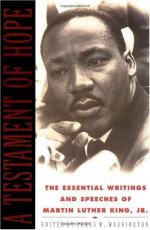
|
| Name: _________________________ | Period: ___________________ |
This test consists of 15 multiple choice questions and 5 short answer questions.
Multiple Choice Questions
1. The desire to be ___________ is appropriate when placed in the proper setting, as when one wants to be first in moral greatness.
(a) Right.
(b) First.
(c) Alone.
(d) Above all.
2. While the South gained respect, the Northern African American drained its ___________ into their struggle.
(a) Finances.
(b) Rights.
(c) Family.
(d) Power.
3. ___________ depends on moving forward in a moral and religious manner, according to Dr. King.
(a) Survival.
(b) Victory.
(c) Power.
(d) Truth.
4. Loss of _____________ of the recognition instinct leads to boasting, crime, overspending, and the desire to put others down.
(a) Truth.
(b) Control.
(c) Acceptance.
(d) Fear.
5. Mr. Carmichael did not believe that a comparison of better or worse could be made in relation to ___________.
(a) Civil rights.
(b) Nonviolence.
(c) Government.
(d) Laws.
6. Dr. King believed that many people were _____________ through an important revolution.
(a) Sleeping.
(b) Jogging.
(c) Lonely.
(d) Hiding.
7. Dr. King believed there was a _________ need to overcome violence without using aggression and domination.
(a) Government.
(b) Truthful.
(c) Moral.
(d) Peaceful.
8. Politicians were needed who would stand up for issues and build and strengthen ___________ between African Americans.
(a) Tensions.
(b) Solidarity.
(c) Communication.
(d) Peace.
9. Dr. King argued that __________ had not given sufficient leadership or attention to the dilemma of racial injustice.
(a) Carter.
(b) Johnson.
(c) Truman.
(d) Kennedy.
10. _________, Alabama was the most violent, ruthless place in which Dr. King and others attempted to gain justice and equity.
(a) Montgomery.
(b) Rockford.
(c) Selma.
(d) Springfield.
11. Dr. King believed the receiving of the Nobel Peace Prize was due to the use of the ___________ response.
(a) Violent.
(b) Nonviolent.
(c) Government.
(d) Murderous.
12. __________ of unions would grow as the African American received the vote, according to the logic of Dr. King.
(a) Recognition.
(b) The size.
(c) Political strength.
(d) The usefulness.
13. ____________ comes from the knowledge that people are interdependent across the world.
(a) Racism.
(b) Peace.
(c) Truth.
(d) Fairness.
14. Each person on earth, according to Dr. King, is a child of God and has the right to expect _____________.
(a) Love.
(b) Honesty.
(c) Respect.
(d) Understanding.
15. What was the name of Dr. King's wife, as told to readers in his autobiography of sorts?
(a) Loretta.
(b) Regina.
(c) Coretta.
(d) Judy.
Short Answer Questions
1. Dr. King accepted the label of ___________, claiming that this sort of nonviolence was powerful and just.
2. The poor live among us, Dr. King points out, but they can easily become ______________ if they are not supported.
3. _________-minded people are realistic, decisive, astute, and firm of purpose, according to Dr. King's observations.
4. Preferred employment and housing opportunities would lift the African American to a ________ similar to the rest of America.
5. Dr. King stated that the distance between promises and the implementation was _________ in the interview.
|
This section contains 418 words (approx. 2 pages at 300 words per page) |

|




